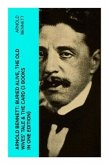Arnold Bennett was born in England's heavily industrialised 'Potteries' district (his fictional 'Five Towns'), leaving for London in 1898, aged 21. Following the success of his first novel, in 1903 he moved to that mecca for all things avant-garde and artistic - Paris. Bennett was drawn to the French literary styles of naturalism and realism, evolving a brilliant synthesis of the two techniques that he uses with such effect in The Old Wives' Tales. In his journal, he speaks of having been inspired to write the novel by observing an old lady in a café in Paris and, looking past the rather uninspiring picture she presented, he thought of how her life might have been lived and the youthful aspirations and disappointments that she may have experienced. By turns sombre, uplifting and thought-provoking, the story follows the lives of two sisters, the adventurous, unconventional Sophia, and Constance, her more dour and custom-bound sibling. Sophia elopes with her lover to Paris, is ultimately abandoned by him, and survives the bloody uprising of the Paris Commune to establish a thriving boarding house. Constance never leaves her family home, marries locally, has a child, and continues the family business. In their declining years the sisters are brought together again and, despite their different paths, they share in their own ways the pride, pathos and banality of life - and their love for each other.
Hinweis: Dieser Artikel kann nur an eine deutsche Lieferadresse ausgeliefert werden.
Hinweis: Dieser Artikel kann nur an eine deutsche Lieferadresse ausgeliefert werden.








